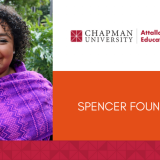Ahmed Younis: The Importance of Critical Pedagogy
November 17, 2014
Recently, there was a full house in the Henley Reading Room of the Leatherby Libraries to hear Chapman University adjunct professor in the College of Educational Studies and PhD student, Ahmed Younis. His topic: “Egypt: the Revolution Continues.” It was the keynote address to mark the opening of a new exhibit in the library, featuring several compelling photographs from the Egyptian revolution, taken in 2011 by the late photojournalist Ali Mustafa, who was killed in 2014 in Syria. (You can see the video of the entire event here. Ahmed begins speaking about 29 minutes into the program.)
Ahmed is earning his second doctorate at Chapman – he is already a lawyer – and I wanted to know more about him, what brought him to Chapman, and what he’s researching. We spoke a few days after his talk.
So how did you first learn about Chapman?
“A good friend of mine graduated in the first PhD class of the CES program, and she advocated that I should entertain Chapman as a place to pursue a second doctorate. As I engaged, I was very impressed with their program, and the Leadership Studies emphasis.”
It must keep you very busy, teaching, researching, and pursuing the PhD full time.
“It requires a certain exertion of effort, but I’m happy with the process. Upon graduation, I hope to get a full time teaching position.”
And what is your area of research?
“I’m looking into the role of critical pedagogy in developing literacy among young people of the devout Muslim identity. In any way of life, in any genre of thinking or learning, developing the skills of critique and the tools of deconstruction necessarily leads to more informed citizens who have higher levels of democratic personhood, and that leads to more intelligent articulation of the core principles of their identity, regardless of where they’re from or what they believe.
“This applies to Americans, young Muslims around the world, people in education all over the world. If young people are not literate about their surroundings and the function of power as it affects them, they will never develop a feeling of ownership of the society in which they live.
“We live in a tumultuous world, and the ability of young people in the U.S. to come into an adulthood that is conducive to global change in a positive direction, in terms of economic development and economic rights is critical for human kind.”
You’re asked to speak often, aren’t you?
“I get opportunities to speak: I recently spoke at the Los Angeles chapter of the Young Presidents of Southern California. I spoke at Mercy Core in Portland, Oregon, for the Muslim Public Affairs Council, and at Loyola Marymount University.”
And now that you’re so involved with Chapman, how do you find it?
It’s a wonderful place. An organization like Chapman that exposes young people to the world, Chapman is a necessary institution to the good things that need to happen in the world. That’s part of why I’m here.”


